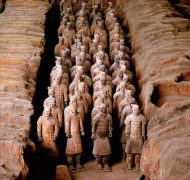The Calling of Samuel (1 Samuel 1-3)
Bible Commentary / Produced by TOW Project
From the closing words of the book of Judges and the opening chapters of 1 Samuel we know that the Israelites are both leaderless and disconnected from God. The closest thing they have to a national leader is the priest Eli, who with his sons runs the shrine at Shiloh. The Israelites’ political, military, and economic prosperity depends on their faithfulness to God. So the people bring their offerings and sacrifices to God at the shrine, but the priests make a mockery of interaction with God. "Now the sons of Eli were scoundrels...for they treated the offerings of the Lord with contempt" (1 Samuel 2:12, 17). They are untrustworthy as human leaders, and they do not honor God in their hearts. Worshipers find that those who should direct them toward an experience of worship are instead stealing from them.
The Perils of Inherited Authority
Somewhat ominously for a nation about to become a monarchy, the first thing we observe is that inherited authority is inherently dangerous for two reasons. The first is that there is no guarantee that descendants of even the greatest leader will be competent and faithful. The second is that being born to power is often a corrupting influence itself, resulting all too often either in complaisance or—as the case of Eli’s sons—entitlement. Eli performs his work as a sacred charge from God (1 Sam. 2:25), but his sons see it as a personal possession (1 Sam. 2:14). Growing up in an atmosphere somewhat analogous to a family business, they expect from a young age to inherit their father’s privileges. Because this "family business" is God's own shrine—giving the family a claim to divine authority over the populace—his sons' malfeasance is all the more injurious.
Third-Generation Leadership (Click to Read)Not only have Jean Bartell Barber and her brother been true to their grandfather's original vision for Bartell Drugs, they have made the pharmacy chain better than it's ever been. In an interview conducted by Ethix's Al Erisman, Barber discusses how the family business has maintained its culture of service in the midst of challenges in the pharmaceutical world presented by online competition, technological changes and governmental regulations.[1] |
Family businesses and political dynasties in today's world have parallels to Eli's situation. The founder of the business or polity may have brought great good into the world, but if the heirs view it as a means for personal gain, those whom they are meant to serve suffer harm. Everyone wins when founders and their successors are faithful to the original, good purpose. The world is a better place, the business and community thrive, and the family is well provisioned. But when the original purpose is neglected or corrupted, the business or community suffers, and the organization and the family are in jeopardy.
The sad history of inherited power in governments, churches, businesses, and other organizations warns us that those who expect to receive power as a right often sense no need to develop the skill, self-discipline, and attitude of service needed to be good leaders. This reality perplexed the Teacher of Ecclesiastes. "I hated all my toil in which I had toiled under the sun, seeing that I must leave it to those who come after me—and who knows whether they will be wise or foolish? Yet they will be master of all for which I toiled and used my wisdom under the sun" (Ecclesiastes 2:18-19). What was true for him is true for us today. Families that gain wealth and power from the success of an entrepreneur in one generation often lose these gains by the third generation and also suffer devastating family quarrels and personal misfortunes.[2] This is not to say that inherited power or wealth always leads to poor outcomes, but that inheritance is a dangerous policy for governance. Families, organizations, or governments that do pass authority via inheritance will do well to develop a multiplicity of means to counteract the perils that inheritance entails. There are consultancies and organizations that specialize in supporting families and businesses in inheritance situations.
God Calls Samuel to Succeed Eli
If not his scoundrel sons, who would succeed Eli as priest? First Samuel 3:1-4:1 and 1 Samuel 7:3-17 reveal God's plan to raise up young Samuel to succeed Eli. Samuel receives one of the few audible calls from God recorded in the Bible, but notice that this is not a call to a type of work or ministry. (Samuel had been serving in the house of the Lord since he was two or three years old, and the choice of occupation had been made by his mother. See 1 Samuel 1:20-28 and 2:18-21.) Nonetheless it is a call to a task, namely to tell Eli that God has decided to punish him and his sons, who are soon to be removed as God’s priests. After fulfilling this calling, Samuel continues to serve under Eli until he is recognized as a prophet in his own right (1 Sam. 4:1) and succeeds Eli after Eli’s death (1 Sam. 4:18). Samuel becomes the leader of God's people, not because of self-serving ambition or a sense of entitlement, but because God had given him a vision (1 Sam. 3:10-14) and the gifts and skills to lead people to carry out that vision (1 Sam. 3:19-4:1). See Vocation Overview for more on the topic of calling to work.








